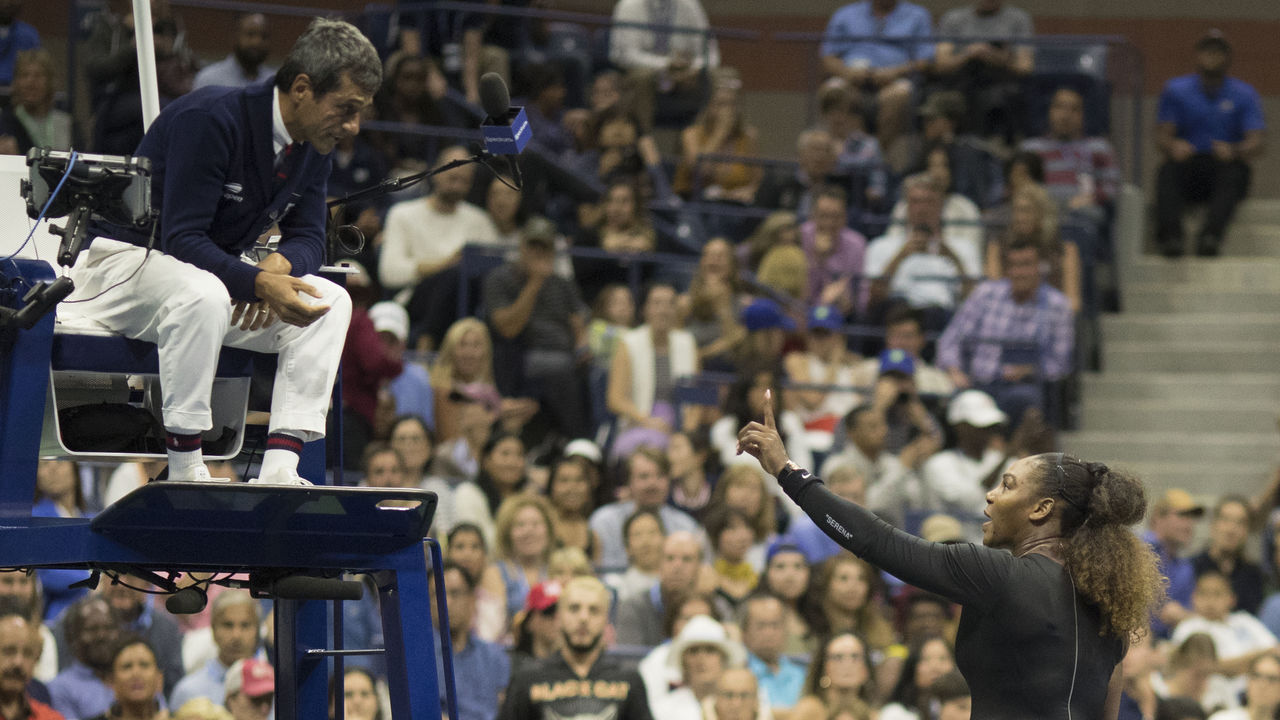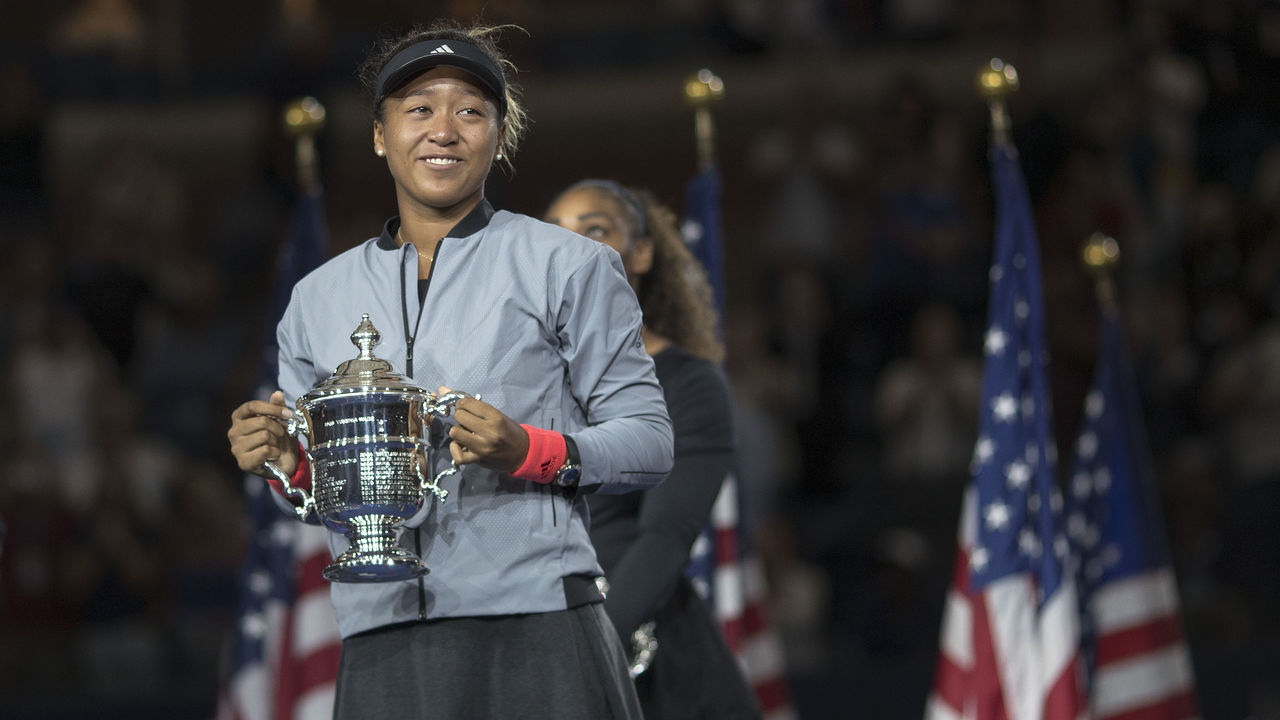Imagining the US Open women's final drama through the eyes of each protagonist
Naomi
Imagine, for a moment, that you're Naomi Osaka. You're 20 years old, playing in your first-ever Grand Slam final, inside the largest tennis stadium in the world, in front of 23,000 people. And you're playing against Serena Williams, the woman you grew up idolizing, who inspired you to pick up a racket in the first place, who won her first Slam when you were just a year old, who's won 22 more since then, and who's trying to equal the record for the most major titles in history.
And you're beating the brakes off her.
Three weeks ago, you were trying to pull yourself out of a rhythm-sapping funk that drove you into a depression. Now, in the US Open final, faced with the task of trying to break your role model's heart, you're almost impossibly focused. Your serve is there for you any time you need it - you can put it anywhere you want to. Nerves can cause the feet to grow heavy, but yours move swiftly and instinctually. You erase break point after break point with big, gutsy hitting and remarkable calm under pressure. At one point, as if to prove you've reached peak lucidity, you track down an approach shot deep in the deuce corner, and, on a dead run, rip a searing cross-court forehand passer that clears the net by a fingernail and leaves Serena in awe.
You win the first set, 6-2, and though you can't maintain quite the same level in the second, you weather Serena's onslaught, and keep marching steadily toward a life-changing win. And then, just as the finish line comes into view, all hell breaks loose. Serena is given a warning, then docked a point, then a game. She's incensed. So is the crowd. The tournament referees are summoned. You're one game away from a US Open title, and inside the stadium a chorus of boos is rising to a crescendo.
Imagine that you somehow manage to block all that out. One game later, you step to the line to serve for the championship, and you blast an ace, two unreturned serves, and a forehand winner past Serena. And then, a short while later, as you're standing on the podium waiting to be awarded the trophy, as what you've accomplished is finally starting to sink in, at this moment you've been working toward for basically your entire life, boos rain down again. Try imagining all that, and think about how you'd react.
Serena
Imagine that you're Serena Williams. You are, by virtually any measure, the most accomplished tennis player in history. The lone marker that could conceivably be held against you is that another player won 24 Grand Slams compared to your 23. And, while Margaret Court's distinction doesn't have much to do with yours - since half her majors were won during an era of amateurism and 32-player Slam draws - the chase for 24 has become A Thing, not just to the fans and to Nike, but to you personally, if for no other reason than you're a born striver, and after all the hurdles you've cleared, here's another rail to try and bound over.
For the second time, you're one win away from equaling Court's all-time record, and for the second time, you cannot find your best tennis in the fateful match. The timing on your groundstrokes is off, your serve isn't landing, your footwork is sloppy, you're pressing, and you're being handily beaten by an exasperatingly talented and undaunted opponent 17 years your junior. You're 37, and only a year removed from a traumatic childbirth that nearly killed you. These opportunities are not guaranteed. But you're not ready to let this one go. You're battling, and beginning to find a rhythm, starting to feel it. Your ball-striking is getting crisper; your serve more precise. You go up a break in the second set. The fans in Arthur Ashe are getting behind you in a full-throated way they rarely have in the past; for so long, this kind of unabashed support was withheld from you, even on home soil.
In the second game of the second set, the chair umpire sees your coach, Patrick Mouratoglou, making a motion with his hands, encouraging you to start moving farther up in the court. You don't notice any implication in the gesture - you think he's giving you a thumbs-up - but the umpire does notice, and gives you a code violation for coaching. It's only a warning, but something about this particular charge sticks in your craw. You take it personally. Maybe that's because the underlying suggestion baked into the penalty insults your sense of self; because it says, "You can't do this on your own."
Maybe being accused for years of taking performance enhancers has made you especially cagey where suggestions of rule-skirting are concerned. Whatever the case, it strikes a nerve, and you let the umpire know that you strenuously object, that you weren't receiving any coaching. (You'll make a point later about how you purposefully don't even use coaching timeouts at WTA Tour events, where they're permitted.) "I don't cheat to win," you tell the umpire. "I'd rather lose."

You take it personally because everything is personal on some level, but also perhaps because there's so much baggage here - in this sport, at this tournament, and on this court. "It's happened to me too many times," you say.
There was 2004, and 2009, and 2011. There were the years of lousy court assignments at Wimbledon, and the notorious incident at Indian Wells. There's the fact that you began this tournament by fielding questions about the president of the French Tennis Association, who'd decreed that the outfit you wore at this year's French Open would no longer be permissible at the tournament. For the past two decades, your mere presence at the top of women's tennis has made people make things personal, for good or ill. Others have attached extraordinary meaning to your life, to everything you are and everything you do: your race, your gender, your background, your body, your attire, your dominance, your words, your choices. Everyone is solipsistic to a degree, but you are one of the rare people for whom solipsism is justified.
Soon, the second set starts to unravel. Your hitting once again becomes nervy and erratic. Suddenly, you can't stop double-faulting. You give back the break. Your frustration boils over. You smash your racket. You're given another code violation - this one inarguable, for racket abuse. This second strike costs you a point, so you start the following game down 15-0. The indignity of the first perceived offense comes burbling back to the surface.
Imagine all that, and how you'd react. Would you let it go, accept the one-point penalty, and move on?
Ramos
Imagine that you're Carlos Ramos. Though the stakes aren't as high, and it's not incumbent on you to try and win anything, this is a Grand Slam final for you, too. It's as big a moment as there is for a tennis umpire.
Typically, an umpire doing their job well means attracting as little attention as possible, but right now, between points early in the second set, you're looking at Serena's coaching box, and Mouratoglou is there, plainly motioning for her to start moving forward. Is it possible to tell whether that message is being received? Should you let it slide, because many of your peers turn a blind eye to in-match coaching? Or do you try and set a precedent in this, your Grand Slam final showcase?
You call a code violation. Serena says her piece, and it's mostly cordial. This is only a warning, after all, and you assume it will go no further. But four games later, Serena smashes her racket, and that one is impossible to ignore; you give her a second violation. Now, Serena is livid, perhaps because she'd expected you to rescind the first violation, and she's demanding that you apologize. She calls you a liar. She says you stole a point from her, and that as such, you're a thief.

The most discretionary possible rule you can enforce as an umpire is a verbal-abuse violation when you're the purported victim. Because only you have the power to hand down the punishment, and only you can know whether you're feeling abused, and to what extent. You're basically making a determination about how thick your own skin is. So, imagine you're umpiring the US Open final, and it's 4-3 in the second set, and Serena is calling you a liar and a thief, and demanding that you apologize for a by-the-book (if selectively enforced) call you made five games ago, and saying you'll never umpire another one of her matches. How thick is your skin?
The aftermath
Of course, we know how this played out. Ramos issued the third code violation, triggering the automatic game penalty. Serena pleaded with tournament officials to undo the damage, to no avail. Osaka served out the match. Boos filled the stadium during the trophy ceremony, and Osaka, during what ought to have been the greatest moment of her life, pulled her hat down over her eyes, and cried.
Everybody had their choices to make. Ramos did not stretch the definition of any rules in penalizing Serena. (That doesn't change the fact that double standards exist in the enforcement of those rules. However, the selective application is an industry-wide problem that Ramos - who has a history of being a stickler, even when top players are involved - should not have to answer for alone.)
Still, most people agree that he should have at least given Serena a "soft warning" before invoking the third strike. We can't know why he chose to umpire this match the way he did, or whether he assessed the game penalty out of straight-laced punitive responsibility, or out of simple wounded pride. And the latter shouldn't simply be dismissed, even if it would represent bad umpiring process. Unless and until we have robot umpires, the sport's on-court officials will be human beings who behave in human ways. You can't defend Serena's racket-busting frustration as a natural expression of emotion in one breath, and then immediately excoriate Ramos for getting touchy when his integrity as an umpire and a person was called into question. We all have latent biases, and perhaps those played into Ramos' decisions. Perhaps not.
For her part, Serena was justified in feeling like those particular rules were being selectively enforced, to her detriment, and not for the first time. But she also had to have known that denigrating the chair ump was going to put her at risk of a third infraction. Ramos should have exercised more restraint, particularly given the stakes and the stage of the tournament. You could say the same of Serena. Those two things are not mutually exclusive, and acting like it's cut and dried, or that there was a right or wrong way for either party to react to any of these extremely unusual circumstances, would be reductive. In a vacuum, these reactions are understandable and justifiable. But of course they did not happen in a vacuum, and the result was a holy mess that ended the women's 2018 Grand Slam season on a bitter note.

On one hand, this is a matter of consistency and fairness from the chair. Throughout the fortnight, umpiring snafus have exposed double standards while sowing confusion left and right. This is the same tournament at which umpire Mohamed Lahyani decided to get down from his chair to try to convince Nick Kyrgios to fight a little bit harder. It's the same tournament at which Frenchwoman Alize Cornet was issued a code violation for unsportsmanlike conduct after accidentally coming back onto court with her shirt on backward and then removing it briefly to put it on properly.
That's an umpiring problem, but more than anything it's an establishment problem. It sure feels like pro tennis as a whole needs to figure itself out and decide what it wants to be. Does it want to be the sport that's broken down more barriers for women than any other, or the one that wears its gender inequality on its sleeve? Does it want to be the sport that promotes expression and individuality, or the one that stays stubbornly glued to its puritanical traditions? Not having a unified governing body, or a players' union, makes that kind of unified decision-making virtually impossible, but until the sport's governing bodies, individually or together, figure out what they want tennis to look like and to represent, this is going to keep happening. That's because nobody seems quite sure what the goal is. In Ramos' interpretation, it was to uphold the sport's code of ethics to the letter of the law. To Lahyani, it was to try and coax a better product out of one of the game's most popular players. Neither of those things has to be right or wrong, but at least one of them ought to be consistent.
This match ultimately wrote itself into a corner it could not escape. It deserved so much better than the ending it got. It should've been a celebration, so let's finish by making it that.
Let's celebrate Osaka's grace, and the unwavering belief with which she served out the match. Let's celebrate the earnestness with which she described "feeling like a kid again" upon embracing her childhood hero at the net, after vanquishing said hero in stunningly routine fashion. Let's celebrate Serena, and her continued advocacy for women, and for mothers in the workforce, and that she's now made the final of two of the three Slams she's played as a mom. Let's celebrate her keen sense of the moment - the way she put aside her smoldering disappointment to put her arm around Osaka during that devastating trophy ceremony, whispering an encouraging word before eventually taking the mic and imploring the crowd to stop booing. And, above all, let's celebrate the champion she inspired Osaka to become.